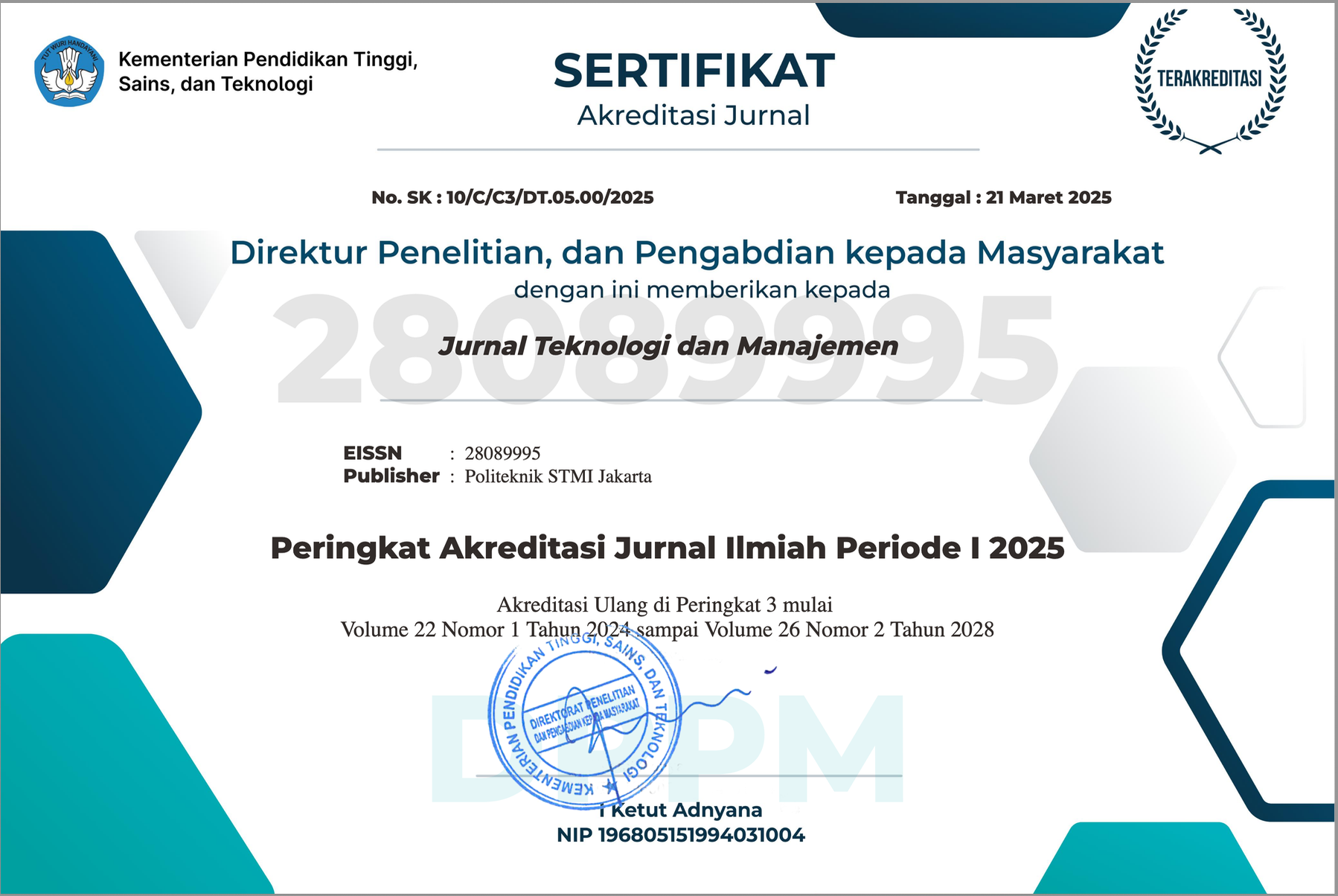Corporate Resilience and Competitiveness Relying on System Digitalization Through Ambidextrous Innovation
DOI:
https://doi.org/10.52330/jtm.v22i1.243Keywords:
Ambidextrous Innovation, Company Resilience, Competitive Advantage, Shipping Agency, System DigitalizationAbstract
The business process of shipping agencies in the post-pandemic is facing adjustments in providing services to customers. A digitalization system carried out by shipping agencies is a solution to respond to these changes and enable shipping agency businesses to survive. This study explored the extent of the impact of system digitalization on the resilience of shipping agency companies and also on the company's competitive advantage mediated by ambidextrous innovation. This study was conducted on 192 shipping agency companies that are members of shipping agency associations in Indonesia's main ports. Data collection was carried out by distributing questionnaires online then data processing was carried out and analysis was carried out, both descriptive statistical analysis and inferential statistics using WarPLS. The research results showed that the existence of a system digitalization program increases company resilience. Likewise, the existence of a system digitalization program also increases the company's competitive advantage. With a proactive response in the form of ambidextrous innovation from the company, digitalization is increasingly showing a significant influence on the company's resilience and also on the company's competitive advantage. The results of this research provide additional empirical contributions in proving the RBV-based theory of competitive advantage where with breakthrough innovation and adaptation to digitalization of the system which is part of the empowerment of company resources aimed at producing service products that are of unique value and cannot be imitated by competitors so that they have a competitive advantage for the company. The results of this research also provide a practical contribution to the shipping agency industry where it cannot be denied that the system digitalization process followed by ambidextrous innovation will increase the company's resilience and produce competitive advantage for the company as well.
References
Abeysekara, N., Wang, H., & Kuruppuarachchi, D. (2019). Effect of supply-chain resilience on firm performance and competitive advantage: A study of the Sri Lankan apparel industry. Business Process Management Journal. https://doi.org/10.1108/BPMJ-09-2018-0241
Abou-foul, M., Ruiz-Alba, J.L. and Soares, A. (2021), “The impact of digitalization and servitization on the financial performance of a firm: an empirical analysis”, Production Planning and Control, Vol. 32 No. 12, pp. 975-989. https://doi.org/10.1080/09537287.2020.1780508
Balci, G. (2021). Digitalization in Container Shipping Services: Critical Resources for Competitive Advantage. Journal of ETA Maritime Science 2021;9(1):3-12. https://doi.org/10.4274/jems.2021.47364
Barney, J. B. (2021). The emergence of resource-based theory: a personal journey. Journal of Management, 47(7), 1663-1676. https://doi.org/10.1177/01492063211015272
Cho, M., Bonn, M. A., & Su, J. H. (2019). Innovation ambidexterity: Balancing exploitation and exploration for startup and established restaurants and impact upon performance. Industry and Innovation Journal, 27(4), 340-362. https://doi.org/10.108 0/13662716.2019.1633280
Clauss, T., Kraus, S., Kallinger, F. L., Bican, P. M., Brem, A., & Kailer, N. (2021). Organizational ambidexterity and competitive advantage: The role of strategic agility in the exploration-exploitation paradox. Journal of Innovation & Knowledge, 6(4), 203-213. https://doi.org/10.1016/j.jik.2020.07.003
Fathi, M., Yousefi, N., Vatanpour, H., & Peiravian, F. (2021). The effect of organizational resilience and strategic foresight on firm performance: competitive advantage as mediating variable. Iranian Journal of Pharmaceutical Research: IJPR, 20(4), 497. https://doi.org/10.22037%2Fijpr.2021.116145.15723
Hidayat, W.A., A. Hermani, A. Budiatmo. (2022). Resiliensi Bisnis pada UMKM Batik Balqis Semarang di Era Pandemi Covid-19. Jurnal Ilmu Administrasi Bisnis. 11 (2), p.207-213. https://doi.org/10.14710/jiab.2022.34445
Ismail, I. J. (2022). I have to apply this strategy! Understanding the mediating effect of digitalization on strategic orientations and sustainable competitive advantage among small enterprises in Tanzania. Management Matters. https://doi.org/10.1108/MANM-01-2022-0019
Lam, J.S.L, and X. Zhang. (2019). Innovative solutions for enhancing customer value in liner shipping, Transport Policy. Vol 82, pp. 88-95. https://doi.org/10.1016/j.tranpol.2018.09.001
Machado, C.G.; Winroth, M.; Carlsson, D.; Almström, P.; Centerholt, V.; Hallin, M. (2019). Industry 4.0 readiness in manufacturing companies: Challenges and enablers towards increased digitalization. Procedia Cirp, 81, 1113–1118. https://doi.org/10.1016/j.procir.2019.03.262
Orinaldi, M. (2020). Peran E-commerce dalam Meningkatkan Resiliensi Bisnis diera Pandemi. Iltizam Journal of Shariah Economic Research, 5 (2),pp.36-53. https://doi.org/10.3063/iltizam.v4i2.594
Poulis, K., G. C. Galanakis, G. T. Triantafillou, and E. Poulis. (2020). Value migration: digitalization of shipping as a mechanism of industry dethronement, Journal of Shipping and Trade, vol. 5, pp. 9. https://doi.org/10.1186/s41072-020-00064-0
Priyanto, P., E. Murwaningsari, and Y. Augustine. (2023). Impact Digital Business Strategy on Competitive Advantage in the Banking Sector. European Journal of Business and Management Research, Vol 8 (2),pp. 65-70. https://doi.org/10.24018/ejbmr.2023.8.2.1875
Putra, Y. S., A. Istiyani, dan U. Khasanah, (2022). Developing SMEs Resilience Through the Role of Digitalization and Human Resource Practices With Competitiveness As Mediating Variable: A Case Study in Kampung Singkong Salatiga, Jurnal Ekonomi Dan Perbankan, Vol 7 (2), p. 136-143
Sabahi, S. dan Mahour M. Parast. (2020). Firm innovation and supply chain resilience: a dynamic capability perspective, International Journal of Logistics Research and Applications, 23:3, 254-269, https://doi.org/10.1080/13675567.2019.1683522
Shehadeh, M. A. Almohtaseb, J. Aldehayyat, and I. A. Abu-AlSondos. (2023). Digital Transformation and Competitive Advantage in the Service Sector: A Moderated-Mediation Model. Sustainability, 2023, 15, 2077. https://doi.org/10.3390/su15032077
Sigalas, C., & Papadakis, V. M. (2018). Empirical investigation of relationship patterns between competitive advantage and superior performance. Journal of Strategy and Management,11(1), 81-111. https://doi.org/10.1108/JSMA-01-2017-0010
Solimun, A., Fernandes, A.A. R., & Nurjannah. (2017). Metode Statistika Multivariat Pemodelan Persamaan Struktural (SEM) Pendekatan WarPLS. Universitas Brawijaya Press
Tajudeen, F.P., Nadarajah, D., Jaafar, N.I. and Sulaiman, A. (2022). "The impact of digitalisation vision and information technology on organisations' innovation", European Journal of Innovation Management, Vol. 25 No. 2, pp. 607-629. https://doi.org/10.1108/EJIM-10-2020-0423
Vaio, A. D., and L. Varriale. (2020). Digitalization in the sea-land supply chain: experiences from Italy in rethinking the port operations within inter-organizational relationships, Production Planning & Control, vol. 31, pp. 220-232. https://doi.org/10.1080/09537287.2019.1631464
Verhoef, P.C.; Broekhuizen, T.; Bart, Y.; Bhattacharya, A.; Dong, J.Q.; Fabian, N.; Haenlein, M. (2021). Digital transformation: A multidisciplinary reflection and research agenda. J. Bus. Res. 122, 889–901. https://doi.org/10.1016/j.jbusres.2019.09.022
Vrana, J.; Singh, R. (2021) Digitization, digitalization, and digital transformation. In Handbook of Nondestructive Evaluation 4.0; Springer: Cham, Switzerland, pp. 1–17. https://doi.org/10.1007/978-3-030-48200-8_39-1
Wang, H., & Fang, C. C. (2022). The influence of corporate networks on competitive advantage: The mediating effect of ambidextrous innovation. Technology Analysis & Strategic Management, 34(8), 946-960. https://doi.org/10.1080/09537325.2021.1934436
Wang, H., & Zhang, Z. (2021). The Influence of Corporate Networks on the Competitive Advantage of High Technology Enterprises in China: The Mediating Effects of Dynamic Capacities and Ambidextrous Combination. International Journal of Financial Studies, 9(3), 42. London, UK: CRC Press, Taylor & Francis Group. https://doi.org/10.3390/ijfs9030042
Zhang, J., Long, J., & von Schaewen, A. M. E. (2021). How does digital transformation improve organizational resilience?—findings from PLS-SEM and fsQCA. Sustainability, 13(20), 11487. https://doi.org/10.3390/su132011487
Downloads
Published
How to Cite
Issue
Section
License
Copyright (c) 2024 Jurnal Teknologi dan Manajemen

This work is licensed under a Creative Commons Attribution-NonCommercial 4.0 International License.



















